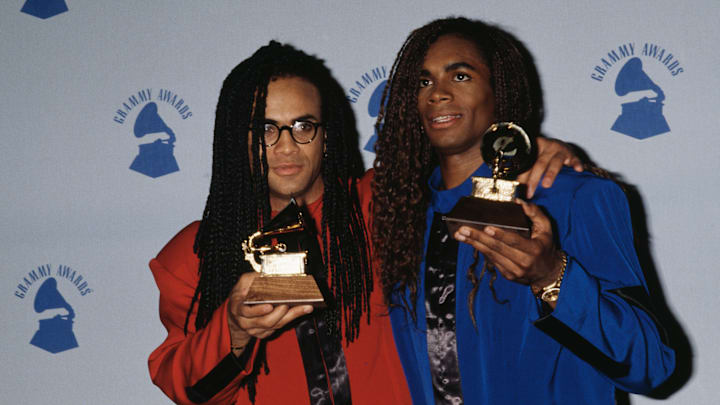An overrated Grammy Awards win refers to a victory that is widely perceived as undeserved or disproportionately praised compared to the artistic, cultural, or critical merit of other nominees. These wins often spark criticism because they seem to prioritize factors like tradition, commercial success, or familiarity over innovation, impact, or cultural relevance.
Such outcomes are viewed as failing to reflect the broader music landscape or the transformative works of the time, leading to debates about the Grammys' credibility and fairness.
Additionally, commercially appealing but less artistically significant works are sometimes rewarded, further highlighting a disconnect between the Academy and cultural trends. These controversies raise questions about whether the Grammys prioritize traditional standards over risk-taking and innovation, leading many to see some wins as undeserved or out of touch.
Seven of the most overrated victories in Grammy Awards history
To prevent overrated Grammy wins, the Recording Academy can focus on increasing transparency, diversifying its voting body, and prioritizing artistry, innovation, and cultural impact over commercial success. Incorporating genre experts, rotating committees, and modernizing the process—such as allowing limited fan input—can help ensure fairer outcomes.
Additionally, emphasizing cultural relevance and creating more specific categories would better reflect the diversity and significance of contemporary music. These changes could reduce bias and make the Grammys more inclusive and representative of the music industry. Here are some of the most frequently cited "overrated" wins in Grammy history and why they caused such strong reactions.
Jethro Tull Beats Metallica (1989 - Best Hard Rock/Metal Performance)
In the inaugural category for Best Hard Rock/Metal Performance, Jethro Tull’s Crest of a Knave won over Metallica’s ...And Justice for All, a pivotal album in metal history. Jethro Tull, a progressive rock band best known for their flute-heavy sound, was not even considered part of the metal genre, which made the win shocking.
Metallica, on the other hand, had established themselves as a defining force in heavy metal with their intricate compositions and raw power. Fans and critics alike felt the win exposed the Grammys' lack of understanding of metal music, sparking outrage and a long-running joke in the music community about how out of touch the Academy was with the genre.
Milli Vanilli Wins Best New Artist (1990 - Best New Artist)
Milli Vanilli’s win for Best New Artist became one of the most infamous moments in Grammy history after it was revealed that the duo did not sing on their own tracks and had lip-synced their way to success. At the time, the group was celebrated for their catchy pop hits, but the scandal that followed not only led to their Grammy being revoked but also left a lasting stain on the credibility of the award.
Many felt the Grammys’ failure to vet artists properly reflected poorly on the institution, with this win standing as a cautionary tale about rewarding surface-level appeal without recognizing genuine talent.
Steely Dan Over Radiohead and Eminem (2001 - Album of the Year)
While Steely Dan is a legendary band, their win over Radiohead’s Kid A and Eminem’s The Marshall Mathers LP felt like a safe, nostalgic choice. Both Radiohead and Eminem had pushed boundaries in their respective genres, making the win feel out of touch with the cultural moment.
Beck Beats Beyoncé (2015)
Beck’s Morning Phase winning Album of the Year over Beyoncé’s self-titled album left many scratching their heads. Beyoncé’s album was a visual and musical triumph, praised for its innovation, cohesion, and cultural significance. Beck’s album, while musically solid, did not have the same cultural or artistic impact.
Critics saw this as yet another example of the Grammys rewarding a traditional, introspective album over a groundbreaking, genre-defying work by a Black artist. The decision reignited debates about the Grammys’ biases and their tendency to undervalue contemporary R&B and hip-hop projects.
Adele Over Beyoncé (2017 - Album of the Year)
Adele’s 25 beating Beyoncé’s Lemonade for Album of the Year is one of the most hotly debated Grammy moments. While 25 was universally praised for Adele’s vocal performance and emotional ballads, Lemonade was a bold, genre-defying work that addressed themes of race, feminism, and infidelity through a groundbreaking visual album.
Even Adele acknowledged that Beyoncé deserved the award, calling Lemonade monumental and saying it inspired her. This loss for Beyoncé was seen as emblematic of the Grammys’ struggle to recognize socially and culturally significant works by Black artists.
Arcade Fire Beats Eminem, Lady Gaga, and Katy Perry (2011 - Album of the Year)
While The Suburbs was a beloved indie rock album, its win surprised many, given the massive commercial and cultural impact of albums like Eminem’s Recovery and Lady Gaga’s The Fame Monster. Critics pointed to the Grammys’ preference for indie darlings over mainstream heavyweights as a recurring theme.
Macklemore & Ryan Lewis Beat Kendrick Lamar (2014 - Best Rap Album)
The win for Best Rap Album by Macklemore & Ryan Lewis’s The Heist over Kendrick Lamar’s good kid, m.A.A.d city sparked widespread backlash. Kendrick’s album was a critically acclaimed concept record that told a deeply personal and socially resonant story, while "The Heist" was perceived as a more mainstream and accessible project.
Even Macklemore himself admitted that Kendrick deserved the award, sharing a text he sent to Kendrick apologizing for the win. This moment highlighted the Grammys’ history of overlooking hip-hop albums with deeper cultural and artistic significance in favor of more commercially friendly choices.
These "overrated" wins often fuel debates about the Grammys' fairness, relevance, and whether they truly recognize the best music of the year. Many fans and critics argue that the awards prioritize commercial appeal or traditional standards over innovation and cultural impact, which can make certain wins feel undeserved in hindsight.
